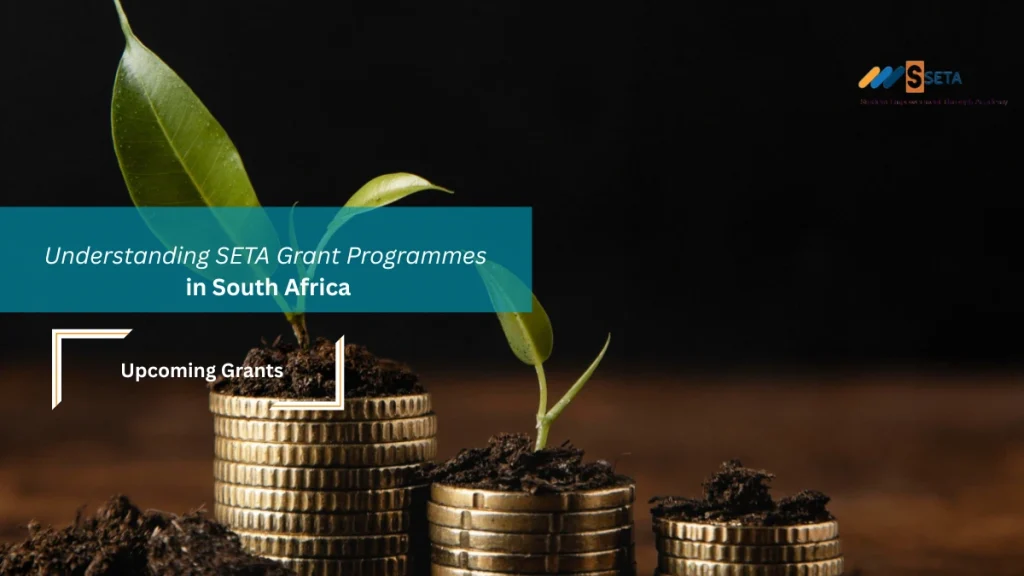Meta Description:
Discover how SETA Grant Programmes support skills development in South Africa. Learn the difference between Mandatory and Discretionary Grants, who qualifies, and how companies can apply for funding to build workforce skills and drive national growth.
What Are SETA Grant Programmes?
South Africa’s SETA Grant Programmes are a cornerstone of the country’s strategy to promote skills development and employment growth. Administered through the Sector Education and Training Authorities (SETAs), these grant programmes provide financial incentives and support to organizations that invest in training and development.
In a rapidly changing economy, skills shortages remain one of South Africa’s biggest challenges. SETA grants aim to close these gaps by funding initiatives that equip workers and learners with practical, industry-relevant skills.
There are two main types of grants under the SETA system: Mandatory Grants and Discretionary Grants. Each serves a specific purpose but together they form a comprehensive framework for building a skilled and competitive workforce.
The Role of SETAs in Skills Development
The Sector Education and Training Authorities (SETAs) were established under the Skills Development Act of 1998 to coordinate and implement sector-specific skills development strategies. There are currently 21 SETAs, each responsible for a specific sector such as finance, transport, services, health, agriculture, or construction.
SETAs manage the collection and disbursement of the Skills Development Levy (SDL), which employers pay to the South African Revenue Service (SARS). This levy — equal to 1% of a company’s total payroll — is used to fund training initiatives across industries.
SETAs play a critical role in aligning workplace learning with national priorities by:
- Identifying scarce and critical skills within each sector
- Supporting companies in developing Workplace Skills Plans (WSPs)
- Managing funding through grants and learnerships
- Promoting public-private collaboration in training initiatives
- Ensuring accountability and performance through quality assurance
1. Mandatory Grants
What Are Mandatory Grants?
Mandatory Grants are financial reimbursements provided to employers who actively participate in the national skills development system. They represent 20% of the total 1% skills levy that companies pay to their respective SETA.
The main objective of this grant is to encourage companies to plan, implement, and report on employee training. By doing so, organizations not only benefit financially but also contribute to a stronger, more capable workforce.
Useful Links:
- Learnerships Programme 2025
- Online courses
- Funding Bursaries
- Internships Programme
- Youth Opportunities
Purpose of Mandatory Grants
The purpose of the Mandatory Grant is to ensure that employers:
- Identify and address skills gaps within their workforce
- Develop structured training programmes aligned with sectoral priorities
- Report on progress and outcomes through recognized reporting systems
- Support the development of scarce and critical skills identified by SETAs
In essence, Mandatory Grants reward organizations for contributing to national skills intelligence and for taking measurable action toward workforce development.
Who Can Apply for Mandatory Grants?
To qualify for Mandatory Grants, companies must meet specific requirements:
- Be registered with SARS and paying the 1% Skills Development Levy
- Submit a Workplace Skills Plan (WSP) and an Annual Training Report (ATR) by the SETA’s stipulated deadline
- Ensure compliance with all SETA requirements and deadlines
How to Apply for a Mandatory Grant
- Register with the relevant SETA: Determine which SETA your company falls under based on your core business activities.
- Prepare your Workplace Skills Plan (WSP): Outline the training needs of your employees for the upcoming year.
- Compile your Annual Training Report (ATR): Provide evidence of all training conducted during the previous year.
- Submit through the SETA Management Information System (MIS): Each SETA has an online portal for WSP/ATR submissions.
- Await feedback and approval: Once approved, you’ll receive the Mandatory Grant payment as a reimbursement of part of your Skills Development Levy.
Important Note:
Failure to submit your WSP and ATR by the deadline results in forfeiting the grant. This underscores the importance of planning early and maintaining accurate training records.
Contact Information for Mandatory Grant Queries
If you require assistance or clarification regarding Mandatory Grants, you can contact your SETA directly.
For example, the Services SETA provides the following contact details:
- Email: [email protected]
- Telephone: 011 276 9600

2. Discretionary Grants
What Are Discretionary Grants?
Discretionary Grants are additional funds that SETAs allocate to projects and programmes that address specific skills needs within a sector. Unlike Mandatory Grants, which are formula-based reimbursements, Discretionary Grants are competitive and project-driven.
SETAs use these grants to fund training initiatives that improve employability, close skills gaps, and promote social and economic transformation.
Purpose of Discretionary Grants
The Discretionary Grant mechanism allows SETAs to:
- Support learnerships, apprenticeships, and internships
- Develop scarce and critical skills across industries
- Provide funding for small and medium-sized enterprises (SMMEs)
- Encourage collaboration between employers, public institutions, and communities
- Strengthen the overall capacity of the national skills development system
Essentially, Discretionary Grants empower SETAs to respond to changing sectoral needs, ensuring that training aligns with emerging technologies and market demands.
Who Can Apply for Discretionary Grants?
Eligibility criteria vary slightly between SETAs, but typically the following stakeholders can apply:
- Levy-paying companies registered with the relevant SETA
- Non-levy-paying SMMEs or community-based organizations
- Public education institutions, including TVET colleges and universities
- Non-profit organizations (NGOs) working in education and training
- Government departments or agencies implementing skills initiatives
This broad eligibility promotes inclusivity, ensuring that both private and public entities can access support to drive skills development in their communities.
How to Apply for Discretionary Grants
- Monitor Open Grant Windows: Each SETA announces open application periods, known as Discretionary Grant Windows, through its official website and media channels.
- Read the Guidelines: Review the Discretionary Grant Policy and application criteria carefully to ensure compliance.
- Prepare a Proposal: Clearly outline the project’s objectives, targeted beneficiaries, budget, and expected outcomes.
- Submit the Application: Applications are submitted through the SETA’s online grant management system or portal.
- Await Evaluation: SETAs review all submissions based on relevance, feasibility, and alignment with the Sector Skills Plan (SSP).
Successful projects receive funding to implement skills programmes, with reporting and monitoring requirements to ensure accountability.
The Relationship Between Mandatory and Discretionary Grants
Both grant types work together to achieve South Africa’s broader skills development goals:
| Grant Type | Purpose | Funding Source | Beneficiaries | Focus |
|---|---|---|---|---|
| Mandatory Grant | Reimburse employers for training investments | 20% of Skills Development Levy | Levy-paying employers | Internal employee training |
| Discretionary Grant | Support national skills initiatives | 49.5% of Skills Development Levy | Employers, SMMEs, public & private institutions | External training & sectoral projects |
By integrating these two grant mechanisms, SETAs can both reward employers who invest in their workforce and fund strategic projects that address broader skills shortages.
Benefits of Participating in SETA Grant Programmes
1. Financial Incentives
Companies that comply with SETA grant requirements receive direct financial returns, helping offset training costs and promoting continued investment in workforce development.
2. Enhanced Skills and Productivity
Through funded training, organizations benefit from employees who are more skilled, motivated, and productive, resulting in improved performance and competitiveness.
3. National Contribution
Participation contributes to the National Skills Development Strategy (NSDS), supporting South Africa’s goal of achieving inclusive economic growth and reducing unemployment.
4. Support for SMMEs and Community Development
Discretionary Grants empower small businesses, youth, and marginalized groups by funding learnerships and community-driven training initiatives.
5. Improved BBBEE Compliance
Training initiatives funded through SETA grants contribute toward Skills Development points on the B-BBEE scorecard, enhancing a company’s compliance and competitiveness.
Common Challenges and How to Overcome Them
While SETA grants provide significant benefits, many companies face challenges with compliance and administration.
Common Issues Include:
- Late or incomplete submission of WSPs and ATRs
- Poor understanding of SETA processes and systems
- Insufficient documentation to support claims
- Lack of dedicated training coordinators
Solutions:
- Assign a Skills Development Facilitator (SDF) to manage submissions and liaise with SETAs.
- Attend SETA information sessions or webinars.
- Keep accurate training records and proof of learner attendance.
- Begin preparing WSPs and ATRs well before deadlines.
Proactive management ensures smooth submissions and maximizes access to available funding.
Contacting SETAs for Grant Support
Each SETA provides dedicated contact channels for grant-related queries. Employers and organizations should always consult their sector-specific SETA for detailed application instructions.
For example:
- Services SETA Contact Information:
- Email: [email protected]
- Telephone: 011 276 9600
Visit the official SETA website that corresponds to your sector for up-to-date information about grant windows, policies, and templates.
Final Thoughts: Building a Skilled Nation Through SETA Grants
SETA Grant Programmes play a vital role in shaping South Africa’s human capital and economic future. By investing in skills development, SETAs not only empower individuals to secure sustainable employment but also strengthen the nation’s productivity and global competitiveness.
Whether you are an established company seeking to reclaim training investments or an organization developing community-based learning initiatives, SETA grants provide a structured pathway to achieve measurable results.
Employers are encouraged to make the most of this opportunity — submit your Workplace Skills Plans, monitor open grant windows, and participate actively in South Africa’s journey toward a skilled and inclusive economy.
Quick Reference Summary
| Grant Type | Purpose | Eligibility | How to Apply | Contact |
|---|---|---|---|---|
| Mandatory Grants | Reimburse employers for training activities | Levy-paying companies | Submit WSP and ATR annually | [email protected] |
| Discretionary Grants | Fund sectoral skills projects | Employers, SMMEs, public and private institutions | Apply during open grant windows | Relevant SETA website |
In Summary:
SETA grants are not just funding mechanisms — they are strategic enablers of skills transformation. By understanding and utilizing Mandatory and Discretionary Grants effectively, South African employers and institutions can play a pivotal role in building a future-ready workforce that drives national growth, innovation, and shared prosperity.

